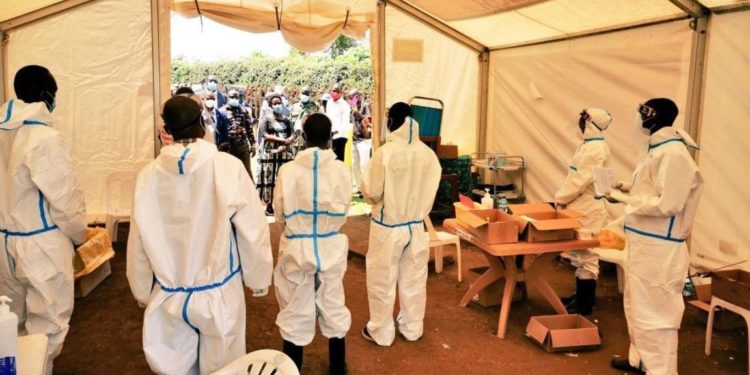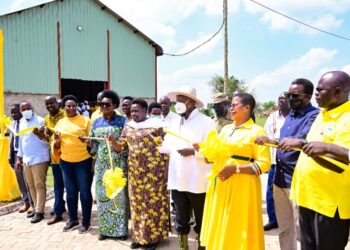Kampala: The Ministry of Health and Twaweza are coming together to share critical information about men and women’s perspectives on health issues amid significant case numbers and fatalities from Covid-19 in the country.
Twaweza collected data from citizens across the country and residents of Kampala, Kyotera and Tororo to understand men and women’s opinions and experiences of health services in Uganda. The data being shared were collected nationally in December 2020 from 1,590 respondents and from 768 residents of Kampala, 639 residents of Kyotera and 622 residents of Tororo in June 2021.
Twaweza has been collecting data around citizens’ knowledge, opinions and behaviours around Covid-19 since May 2020 to support government efforts to combat the pandemic.
Both men and women cited health issues and diseases as the country’s primary issue in December 2020.
However, women (49%) are slightly more likely to name health issues than men (44%). Women are also a little more likely than men to point to concerns with unemployment, while men are slightly more likely than women to point to corruption or inequality as problems. Overall, these differences are minor:
generally country’s significant issues, men and women share similar views on the country’s major issues.
Women are generally more likely to notice gaps in healthcare services given their role as caregivers in families and communities and because of their often more frequent interactions with this sector during pregnancy, childbirth and child-rearing. In this area, there have been downward trends in the critical area of treatment for special groups.
Policy in Uganda indicates that pregnant women, those over 60 and children under five are entitled to free treatment and care from government facilities.
However, citizens who report that this policy is in practice dropped between 2018 and 2019: more pregnant women (75% compared to 62%), children under five (68% compared to 62%), and elderly citizens (62% compared to 56%) received free care in 2018 than in 2019.
In addition, Ugandans overall observe significant increases in social ills during the Coronavirus pandemic. Around half of or more citizens see increases in physical violence (51%), emotional violence (51%), sexual violence (46%), teen pregnancy (79%), alcohol consumption (58%) and drug abuse (49%).
Interestingly, women and men are united in the perception that challenges facing women have increased during the pandemic. Similar proportions of men and women report increases in physical
violence (men: 49%, women: 54%), emotional violence (men: 49%, women: 53%), sexual violence (men:
43%, women: 49%), and teen pregnancy (men: 79%, women: 78%).
Although women are slightly more
likely to report increases in all of these problems except teen pregnancy, the differences are not sharp.
Given that these are largely acts that are perpetuated by men on women, it is noteworthy that men also observe these increases.
When it comes to the Coronavirus specifically, women and men in the three high-risk districts express similar views around their risk of exposure to the Coronavirus, except in Kampala, and around their confidence that they would get the help they needed if they contracted Covid-19, except in Tororo. In
Kyotera, 4 out of 10 women (37%) and men (38%) think that it is not at all likely that they will be exposed to the risk of catching Covid-19 from their daily interactions, while in Tororo, 38% of women and men express the same confidence.
In Kampala, however, women (40%) are more likely to feel that they are not at risk of catching the Coronavirus than men (31%).
But there are much ,more significant differences in geography than gender when it comes to citizens’ confidence in their ability to get the care they need if they contract Covid-19. In Kampala and Kyotera, half of men (Kampala 54%, Kyotera 48%) and women (Kampala 50%, Kyotera 49%) are not at all or not
very confident they would get treatment, while in Tororo, both men (62%) and women (69%) are very or somewhat confident of accessing services if they do catch Covid-19.
Although women in Tororo are slightly more positive than men, the differences between the three districts are much higher than the differences between genders.
Violet Alinda, Twaweza Uganda Country Lead and Director of Voice and Participation, said, “Experience
from around the world during the Covid-19 pandemic has shown us that women bear the brunt of the burden as caregivers but also during the confinement of lockdowns with increases in gender-based
violence. Yet citizens’ own reports show that men and women share similar perspectives on the challenges of the health sector generally and the particular impacts to women of the pandemic and
lockdown measures.These shared perspectives provide an important opportunity for an open and inclusive discussion around gender norms in our society more broadly and how we can better support our women as they care for our families andbcommunities yet often find themselves unsafe in their own homes.”
Dr. Richard Mugahi, Ass. Commissioner Reproductive and Infant Health, Ministry of Health said, “The Government of Uganda is keenly aware of how women have faced a disproportionate burden when it comes to the pandemic. We are pleased to see that men have also observed these challenges and look
forward to trying to advance the discussion around gender and women’s roles in our families, communities and societies.”
Do you have a story in your community or an opinion to share with us: Email us at editorial@watchdoguganda.com













